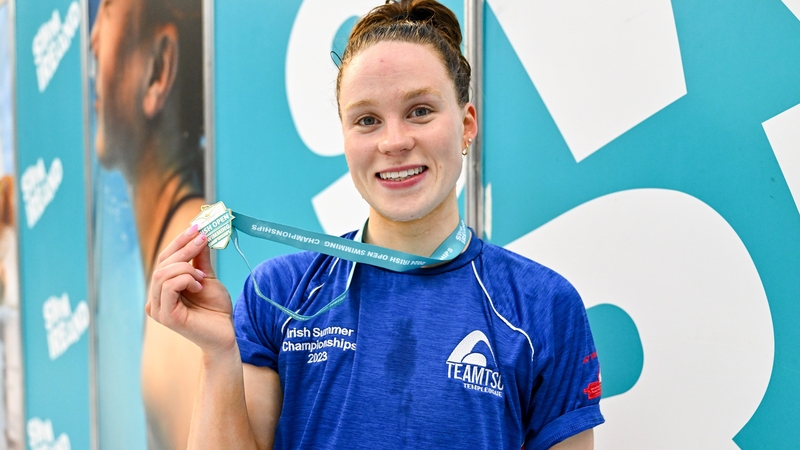It was a surreal experience for those competing at the Tokyo Olympic Games, the absence of fans making for a rather eerie experience.
For swimmer Ellen Walshe it was, in her own words, "a whirlwind of emotions". She only qualified three weeks in advance, a surprise addition she freely admits, as she made her Olympic bow in the 100m butterfly and 200m individual medley.
For Paris, Walshe booked her ticket a year out after breaking the Irish record in the 200 IM at the World Aquatics Championships in Fukuoka, Japan. The Templeogue competitor will now compete in four events in the French capital; the 400m medley relay and the 400m individual medley also on her agenda, this after breaking Michelle Smith's Irish record for the latter event that stood for 28 years at the Leinster Championships in April.
Still only 22, Walshe's journey so far has been eventful, in that she has dealt with illness and nerves. There was also a period studying in the University of Tennessee, while a World Championship Short Course silver medal was won in the 400 IM in 2021.

With the Paris Games nearly upon us, Walshe was in upbeat mood when she spoke to the media on how she's feeling before her second Olympic appearance.
"I've been a whole year waiting for these Games but I have been able to get a ton of work done and have not had to taper down to compete," she said.
"Last summer was the first time we could qualify for the Olympic Games. I came back from a big illness, I got glandular fever - it took eight months to recover from that, so the summer was the first time we could qualify and I wanted to do it there and then.
"It was extremely helpful and handy to qualify in the first period that we got - to get my head down and get work done. I think that's why I have been on a progressive.
"For my last Olympics in Tokyo, I only qualified three weeks beforehand, so I've kind of dealt with both sides of it but qualifying earlier is a lot handier."
Walshe's route to Tokyo, belated as it was, took many by surprise. Reflecting on days when restrictions were in place, she added: "It was during Covid, so I was able to train with my coach the whole way through in my home pool in Templeogue. When the first trials came around, I think I was two seconds off the time; I wasn't really hopeful.

"Something just clicked within those four weeks where we had the second trial and got my hand on the wall with a 2:12 (200 IM). That was me on the plane to Tokyo.
"It was completely different to qualifying a year out. I wasn't expecting to go to Tokyo and I don't think anyone else expected me to go. In the end I had to get photos for the media and I was on a plane, going half way across the world, with no family, no nothing. It was a whirlwind of emotions and I don't think I was the happiest swimmer over there. We made it through; I'm an Olympian now and no one can take that away from me."
That feeling of unhappiness did curtail Walshe's performance in the Japanese capital, as she failed to reach the semi-finals in her respective events. Quite simply nerves took hold.
"I was a way too nervous and I didn't know how to control it," she revealed.
"It's has taken many years, all my junior years to discover that nerves are a real thing, they are just energy. I care, so I am going to feel like this, but I've worked things out by myself and have realised what works for me in the call room. It's now about staying calm and doing a few breathing exercises. How many times I have done this race before? - that's the question I ask myself when I get to the block. Since then I have progressed forward."
"As a junior athlete, a young 15, 16 year-old, you are undefeatable: everything you say is right. I was definitely a bit of a diva when I was younger and no one was going to get in the way of that"
Such progression, she thought, should have occurred earlier in her life; a belief that one could handle things. It took time, however, to get those moments of heightened anxiety under control.
"As a junior athlete, a young 15, 16 year-old, you are undefeatable: everything you say is right. I was definitely a bit of a diva when I was younger and no one was going to get in the way of that. I didn't know how to deal with it as a junior athlete and I don't think it's talked about enough in the junior ranks.
"In senior it is well talked about; there are resources there, but as junior coming up you don't have the support around you. I kind of figured it out on my own, to be honest. It did take many years, I probably wasted, well I can't say wasted, but it did hurt my junior years a lot by not being able to deal with nerves.
"I go out and I get to the block and I'll be all pumped and ready, and that's it, my head would be like 'no'. I would just finish the race. It took a while to get over that. The first time that I probably noticed that I learned to control it was qualifying for the Olympic Games."
Walshe, like a lot of other competitors and those from others walks of life who perform before the public gaze, is now only too aware that controlling the nerves is a battle, while also aware they can still impact negatively on performance.
"I don't think anybody else knew that I struggled with it. It was something that me, myself and I were going to figure out. If that's good thing or bad thing, I'm not sure. I did manage, probably over three to four years, managing them nerves by just talking to myself and thinking about all the training you've put in, all the hard work, all them sets.
"But every time I raced I just became unsatisfied and every time I trained it was just harder and harder. And then one day it just all clicked, it all got put together. It's not to say that they [the nerves] haven't got in the way recently, in the last year or two. Nerves are a good thing but learning to control them was the most important thing for me."

In between the Olympic cycles, Walsh dealt with glandular fever. While studying and competing in Tennessee, she realised something was wrong, but wasn't surely exactly what was wrong.
And then came a somewhat blunt request.
"It was after competing in SECs when I was told that I can't train. Someone had to stand in front of me and say 'you can't enter that pool'."
And ultimately the decision was made to return to Ireland.
"It was really, really tricky. Diagnosing it was one thing, I was over in the States, competing in SECs (South Eastern Conference) and NCAAs, I was a very valuable athlete to that team. That was the hardest bit to step back from but I was not okay myself. It took a while to figure it out and I just put myself on a plane and went home. We dealt with it on this side.
"The team have been great in Sport Ireland. My own GPs and doctors have been great in helping me get back to where I wanted to be. It took many months and a lot of frustration. A comeback is one of the toughest things, because you're not hitting the target time that you've hit before, you don't know if you can ever make it back to the position you were in.
"I have been a very lucky athlete, stayed out of injuries and illnesses. I don't get them that often. Fortunately when I did, I got a bad one. Taking a step back was tough, realising that something was wrong was hard to hear. You learn the hard way, now I don't take my health for granted. It's the most powerful thing; there is only one me in the world. You had to take a step back."
Your health is you wealth, a phrase that goes without saying, and now even more so for Walshe after her brush with glandular fever.
"It's not like a chest infection that you can turn around in a couple of weeks," she revealed.
"It takes longer; your body has to heal itself and nothing can heal it. No medication can heal it, it's just rest and recovery. It's hard for athletes to hear that you can't do any exercise. Now, If I do fall sick, me and my coach will take a step back, it's just not worth the risk anymore."
Walshe has the option to resume her studies at the University of Tennessee, a place she found "extremely welcoming" and where fellow Olympian Mona McSharry is currently based, but for now she's "happy" to be at home and competing for Templeogue.
Walking out to the fans in Paris is something Walshe is looking forward to, in marked contrast to what she experience three summers ago.
"The Olympics is definitely going to be different. It's a small Irish team and we don't all train together; we don't know each other on the same level. It's going to be amazing to walk out to Irish people in the stands. Most of the world swimming events are in Singapore, in Japan, and most people can't travel. Financially it doesn't always work out. To embrace the moment with Irish flags is going to be a very special moment.
"In Tokyo, they had built a massive stadium. The athletes were on one side and nobody on the other side. But it was my first Olympics and I didn't know any different. I was never in a stadium that big.
"In the National Aquatic Centre, it's just one side and parents come and go, but to have every seat full in Paris is going to be amazing."
Follow the Summer Olympic Games across RTÉ Sport from 24 July

